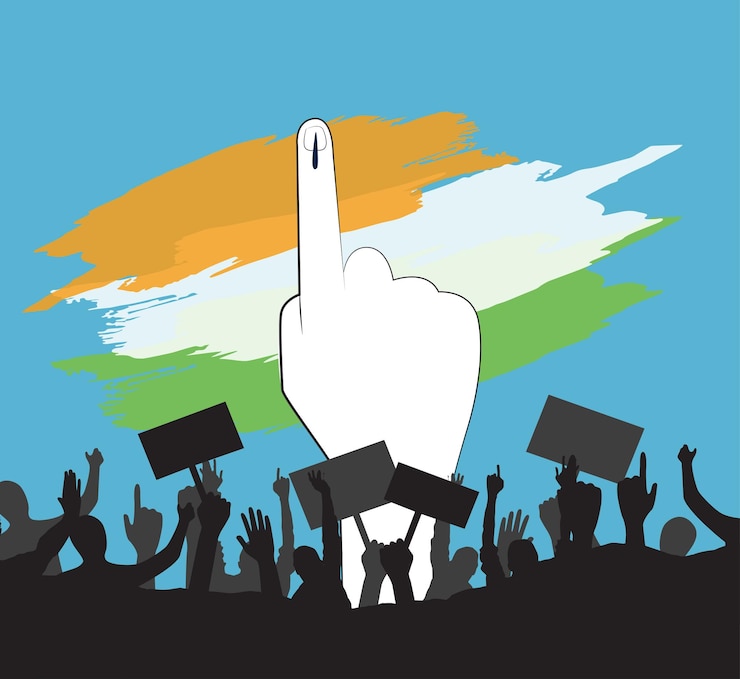The political scene in India today, in 2025, is a mix of challenges and developments, as the country moves forward in a rapidly changing environment. While the current political landscape remains dominated by the Bharatiya Janata Party (BJP), several new dynamics are emerging, especially at the regional level. Key issues such as education reforms, women’s rights, and national security continue to influence the political discourse. Let’s dive into the latest political updates in India.
1. Modi Government Retains Dominance
Prime Minister Narendra Modi and his party, the BJP, continue to hold significant political power in 2025. The government remains firmly in control, focusing on its pro-development agenda, which has helped Modi maintain a strong base of support. Key initiatives like Atmanirbhar Bharat (Self-Reliant India), Digital India, and Make in India have shaped the party’s narrative of progress.
Despite the BJP’s success in steering India’s economic and infrastructure policies, criticisms around governance, religious polarization, and freedoms of expression are raising concerns. The upcoming 2024 general elections will be pivotal, as opposition parties seek to challenge the government’s dominance.
2. Opposition Faces Struggles and Shifts
The Indian National Congress (INC), long regarded as the country’s dominant political party, has found it difficult to reclaim its lost ground in recent years. In 2025, under the leadership of Mallikarjun Kharge, the party is focusing on rebuilding its grassroots network and rejuvenating its support base. However, it faces a tough road ahead in the face of the BJP’s overwhelming presence.
Meanwhile, regional parties have started to play a key role in India’s political future. Leaders like Mamata Banerjee of the Trinamool Congress (TMC), Arvind Kejriwal of the Aam Aadmi Party (AAP), and Sharad Pawar of the Nationalist Congress Party (NCP) are gaining influence and focusing on local issues. These leaders are also attempting to unite to form a formidable opposition to the BJP, but coalition-building remains a challenge due to differences in their regional agendas.
Mamata Banerjee’s TMC is making strides beyond West Bengal, expanding influence in states like Tripura and Assam, while Kejriwal’s AAP continues to thrive in Delhi and Punjab. Despite these successes, the opposition’s ability to present a united front remains uncertain.
3. State Elections and Regional Power Shifts
State elections in India in 2025 are creating intense political rivalries. Key states such as Uttar Pradesh, West Bengal, Tamil Nadu, and Maharashtra are witnessing fierce battles, as political parties aim to consolidate power at the regional level.
In Uttar Pradesh, Yogi Adityanath, the incumbent Chief Minister, retains strong support, especially among voters who prioritize law and order. However, his government faces opposition due to concerns over religious tensions and authoritarian policies.
In West Bengal, Mamata Banerjee continues to hold sway, focusing on social welfare policies while challenging the BJP’s influence in the state. Similarly, MK Stalin’s DMK remains a strong force in Tamil Nadu, advocating for regional autonomy and the protection of Tamil identity.
As these regional leaders make their mark, the growing significance of state-level politics is becoming increasingly evident. These elections are not just about local governance but are increasingly seen as a reflection of national sentiment.
4. Controversy Surrounds the National Education Policy (NEP)
The National Education Policy (NEP) has emerged as one of the most debated topics in India’s political discourse in 2025. The Modi government’s ambitious reforms in the education sector have faced criticism from several political quarters, with opponents arguing that the policy is overly centralized and undermines regional languages and local education systems.
The emphasis on mother-tongue education and the shift towards online learning have sparked particular concerns, especially in rural areas where digital infrastructure remains insufficient. The southern states, such as Tamil Nadu and Kerala, have been vocal in their opposition, claiming that the NEP disregards regional identity and autonomy in education.
Despite the pushback, the government continues to promote the NEP as a step toward modernization and uniformity in India’s education system. This issue will likely remain a significant point of contention as political parties gear up for the 2024 elections.
5. Gender Equality and Women’s Rights in Focus
In 2025, women’s rights and gender equality are prominent political issues. The government has implemented several schemes aimed at empowering women, such as increasing the legal age for marriage to 21 and launching welfare programs like Beti Bachao Beti Padhao. However, activists argue that these efforts are insufficient in tackling deeper issues like gender-based violence and workplace discrimination.
While the government claims to be improving women’s welfare, critics believe more needs to be done to ensure women’s safety and equality in all aspects of life, especially in the workplace and public spaces. Opposition parties have also called for more robust measures to prevent violence against women and ensure greater representation of women in political offices.
6. Electoral Reforms to Address Transparency Issues
Electoral reforms are a hot topic in Indian politics as the government and the Election Commission work to address issues of transparency and accountability. In recent years, the rise of digital campaigning and social media ads has led to concerns over the spread of misinformation and the manipulation of public opinion.
The Election Commission of India has recommended measures such as the use of more secure electronic voting machines (EVMs) and greater regulation of digital political ads. There are also calls for reforms in the funding of political parties, as critics argue that the current system disproportionately benefits wealthier candidates and parties with deeper pockets.
These reforms are expected to play a crucial role in maintaining the integrity of elections and ensuring that democratic processes remain transparent and fair.
7. National Security and Foreign Policy Challenges
National security remains at the forefront of India’s political discourse. The country’s relationship with neighboring nations, particularly China and Pakistan, continues to impact both domestic politics and foreign policy.
Tensions over border disputes in regions like Ladakh and Jammu and Kashmir persist, raising concerns over India’s defense preparedness. The government’s response has been a mixture of enhanced defense spending and strategic alliances with countries like the United States, Japan, and Australia through the Quad initiative. India’s growing geopolitical importance in the Indo-Pacific region remains central to its foreign policy as it seeks to balance regional security with diplomatic relationships.
Conclusion
India’s political landscape in 2025 is marked by a blend of continuity and change. While the BJP remains the dominant force in national politics, regional leaders and parties are emerging as significant players. Key issues like education reforms, gender equality, electoral integrity, and national security will continue to drive political debates in the lead-up to the 2024 general elections. As the country moves forward, the political discourse will likely become even more intense, with regionalism and nationalism playing a central role in shaping India’s future.







